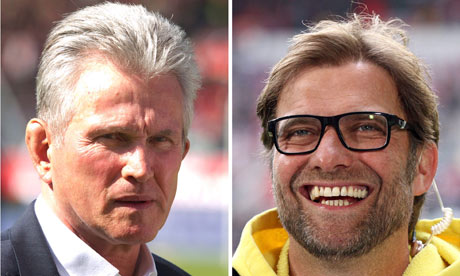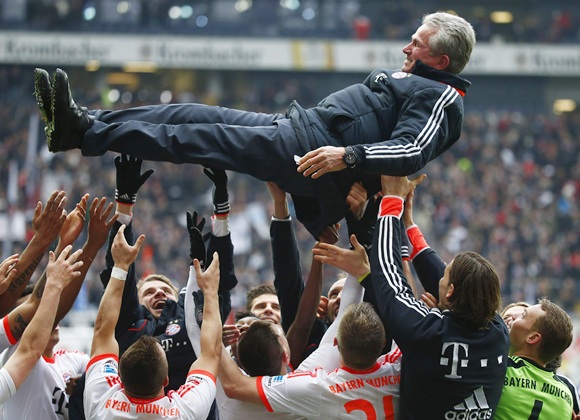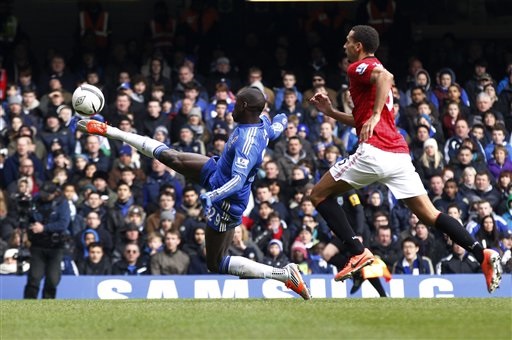It is FCB again that took the trophy home!
Though not the familiar one in Barcelona but the Bavarian
giants Bayern Munich, who on Saturday were crowned UEFA Champions League
winners of 2013.
Bayern Munich’s victory marks a return to the centre-stage
for German football and the Bundesliga after being in the wilderness for some
time. Ever since Porto won the competition against all odds in 2004, the
Champions League has come to be dominated by English teams and Barcelona.
En route to their conquest of Europe, Bayern pounded the
dominant power in Europe, Barcelona into submission. Though nobody expected the
scale of the defeat, it was construed to be the match where the baton changed
hands, from the dominant force of the last half a decade to the force of the
future. A situation akin to when the Germanic tribes reached the gates of Rome
and brought about the end of the Roman empire.
Is this the end of Barcelona’s dominance in Europe?
Are they no longer top dogs in the continent?
Could this prove to be the death-knell for tiki taka?
All of the above were pertinent questions after Barcelona’s
campaign came to a grinding halt against the Bayern machine. It is not often
that you see the Catalans humbled in such a manner – Bayern didn’t just crush
Barcelona, they crushed a footballing philosophy as they hit 7 unanswered goals
past Lionel Messi and co.
What the future holds for Barcelona or for Bayern Munich is
a debate that will go on for long into the summer, however, that is a subject
for another day. Before that, a quick peek at footballing cycles.
FOOTBALLING CYCLES
The game of football, like most other sports operates in
cycles – both at club and at national levels. These cycles exist because
football and the various teams involved continuously strive to evolve in search
of a winning formula. It is not so much a straight line time graph, but merely
a carousel of footballing philosophies, playing style and coaching.
Sport rarely operates in an inertial environment such as the
one in our PlayStation's and Xbox's.
Footballers are human beings , they’re performances over
time become subject to the wear and tear of competition and the many bruises
and niggles that they carry. The other key word in all of it is ‘familiarity’ –
eventually they figure you out. That goes for a player, a system , a strategy.
Those that continually work to keep adding to their game are the ones that end
up being successful in extending their cycle. And in today’s day and age, where
technological aids and analysts are available to every team, it makes it that
much harder.
THE EUROPEAN FOOTBALL SCENE
The UEFA Champions League is a true testament to this.
Shifting the scene to 5 years ago, in the summer of 2008, Barcelona under Pep
Guardiola had their very own ‘changing of the guard’ match. The Blaugrana defeated Manchester United 2-0
in the final that year in Rome. United were defending champions and were
looking to become the first club in the Champions League era to retain the
title. That victory set Barca on their way to European dominance for the next 5
years, while also setting back the progress of English teams.
Hence, the 5-year period between 2008-2012 belonged to
Barcelona – they won 2 titles while making the semi-finals every year. The
previous spell of domination (2004-2007) belonged to the English clubs –
Liverpool, Manchester United, Chelsea and Arsenal who together made it a habit
of blocking out the semi-final spots every year capped off by a title each for
Liverpool and United, and finals appearances for Arsenal and Chelsea.
Real Madrid, both pre and post Galacticos had their run in
the competition before the English clubs between 2000 and 2003. We can take
only the period from 1998 onward into consideration, for previously only the
winners of each league made it into the competition, which meant only 1 team
from each country. Madrid beat Manchester United and Bayern Munich on the way to
claiming the trophy in 2000, the winners and runners-up respectively from the
previous tournament.
DOCUMENTING THEIR SUCCESS
Each of these teams adopted their own set of tactics to foster
success in Europe’s premier competition.
Outgoing Bayern boss Jupp Heynckes guided Real Madrid to
their 7th European Cup in 1997. Following that, Vicente Del Bosque
and his Los Blancos side won it in
2000. It was just before the dawn of the Galacticos
era, a team led by a young Raul, Fernando Morientes and Steve McMannaman. Zinedine
Zidane, Luis Figo, Ronaldo, David Beckham and Claude Makelele joined forces with Roberto Carlos and
Raul and the Galacticos era was born.
That star-studded squad went on to claim another prize in 2002 with that
memorable Zidane volley in Glasgow.
A simple strategy of buying the best players around that
ensured instant success. Trouble was, those stars were picked up in their late
20’s and after a period of time with age their impact waned. And since Real did
not have a system that they played to or stuck to religiously, there was a
problem when they departed and Real could never recreate the success from earlier in the
decade.
The English teams came in with good defences to fend off the
attacking threats of the Spaniards. They brought in a certain level of physical
effort with their powerful defenders and midfielders, who were very good in the
air in defence as well as attack. The English teams’ play was very direct
employing wingers to good effect to deliver crosses into the ball along with
judicious use of the long ball out of defence. Technical brilliance was not the
greatest, but they made up for it in effort and work rate. Hard-working units
with just the right amount of attacking talent served them very well in the
ensuing years.
Before Guardiola arrived at the Camp Nou, Frank Rijkaard
managed to win one Champions League final against Arsenal in 2006. His was an
all-attacking group, equally direct, centred around the talents of Samuel Eto’o,
Ronaldinho and Deco. They got that one win, but they had a traditional Barca
failing in the form of their defence and their dominance didn’t last long. They
may have had superior attackers, but since their attacking styles were
familiar, they proved easy to contain.
Then came the tiki-taka,
the hogging of possession for long periods and accurate passing of the ball
from Guardiola’s stable. Whether it was intended that way, nobody will know,
but the tiki-taka hit the English
teams in an area where they were vulnerable. They were superb clearing headers
and defending long balls and did well to cut out the through passes. Part of
the reason was their tight defensive organization. What Barca’s system did was
stymie their English foes, deny them the ball to get their forward players
frustrated and patiently pass the ball around, waiting until a member broke the
line after which they could play in that killer final pass. Slow in their
lateral movement, the system wore them down as they spent large portions of the
game tracking the ball. The high pressing game, 8 passes or less in which they
tried to regain possession was also classy. Creating space for their players to
run was central to Barca’s success plan.
And now, Bayern have brought their own heavy duty arsenal
over the past 2 seasons – a combination of high intensity pressing to peg back
the opponents and fast, direct attacks. Whether this means a new era of Bayern
dominance, we’ll have to wait and watch; Inter and Milan have had successful
winning campaigns in the past without kicking on to extend it further. Also,
there will be a change in management - Guardiola will come in for Heynckes – a
completely different approach may be taken by the Spaniard; in which case the
lack of continuity could hurt them. Inter won the trouble under Mourinho,
before having a disappointing season the next term after the Portuguese left.
What is certain is that we have witnessed the end of one
footballing cycle and the beginning of the next!










.jpg)



.jpg)




















+attends+a+press+conference+with+Manchester+United+manager+Alex+Ferguson+(C)+and+fellow+new+signing+Nick+Powell+.jpg)

















